Complete Solutions to COMPETITION FILE (C. MULTIPLE CHOICE QUESTIONS) of chapter MOVING CHARGES AND MAGNETISM of Class 12 book with complete answers and questions
| Class 12 | PHYSICS |
| Chapter | MOVING CHARGES AND MAGNETISM |
| MODERN PUBLICATION | COMPETITION FILE (C. MULTIPLE CHOICE QUESTIONS) |
| Number Of Questions | 28 |
| Academic Year | 2023-24 |
A uniform current `I` is flowing in a long wire of radius `R`. If the current is uniformly distributed across the cross-sectional area of the wire, then
View SolutionA long cylindrical wire carries a steady current which is uniformly distributed across its cross section. Which of the following is true?
View SolutionIf there is one hollow metallic tube which carries current uniformly distributed over its surface, which of the statements is correct?
View SolutionConsider a wire carrying a steady current, I placed in a uniform magnetic field `vecB` perpendicular to its length. Consider the charges inside the wire. It is known that magnetic forces do not work. This implies that
View SolutionA long, straight wire carries a current along the z-axis. One can find two points in the x-y plane such that
View SolutionIn which of the following cases, will the charged particles not experience any electromagnetic force?
View SolutionThere is one conducting disc of radius r rotating about its axis with angular speed `omega`. There is a uniform magnetic field B, applied in the region as shown in the figure perpendicular to the plane of disc.

O is the centre of disc and Pis a point on its periphery, Which statment is true in the context of the same?
View SolutionA circular loop of radius `0*2m` carrying a current of `1A` is placed in a uniform magnetic field of `0*5T`. The magnetic field is perpendicular to the plane of the loop. What is the force experienced by the loop?
View SolutionFor a current loop we can define magnetic moment `mu` .
View SolutionMagnetic field is applied perpendicular to the plane of paper as shown in the figure. Circular loop is translating with a velocity v as shown in the figure.

View SolutionIn a coaxial, straight cable, the central conductor and the outer conductor carry equal currents in opposite directions. The magnetic field is zero.
View SolutionA positive charge is moving towards an observer. The direction of magnetic induction lines is
View SolutionThe magnetic field at the origin due to the current flowing in the wire is
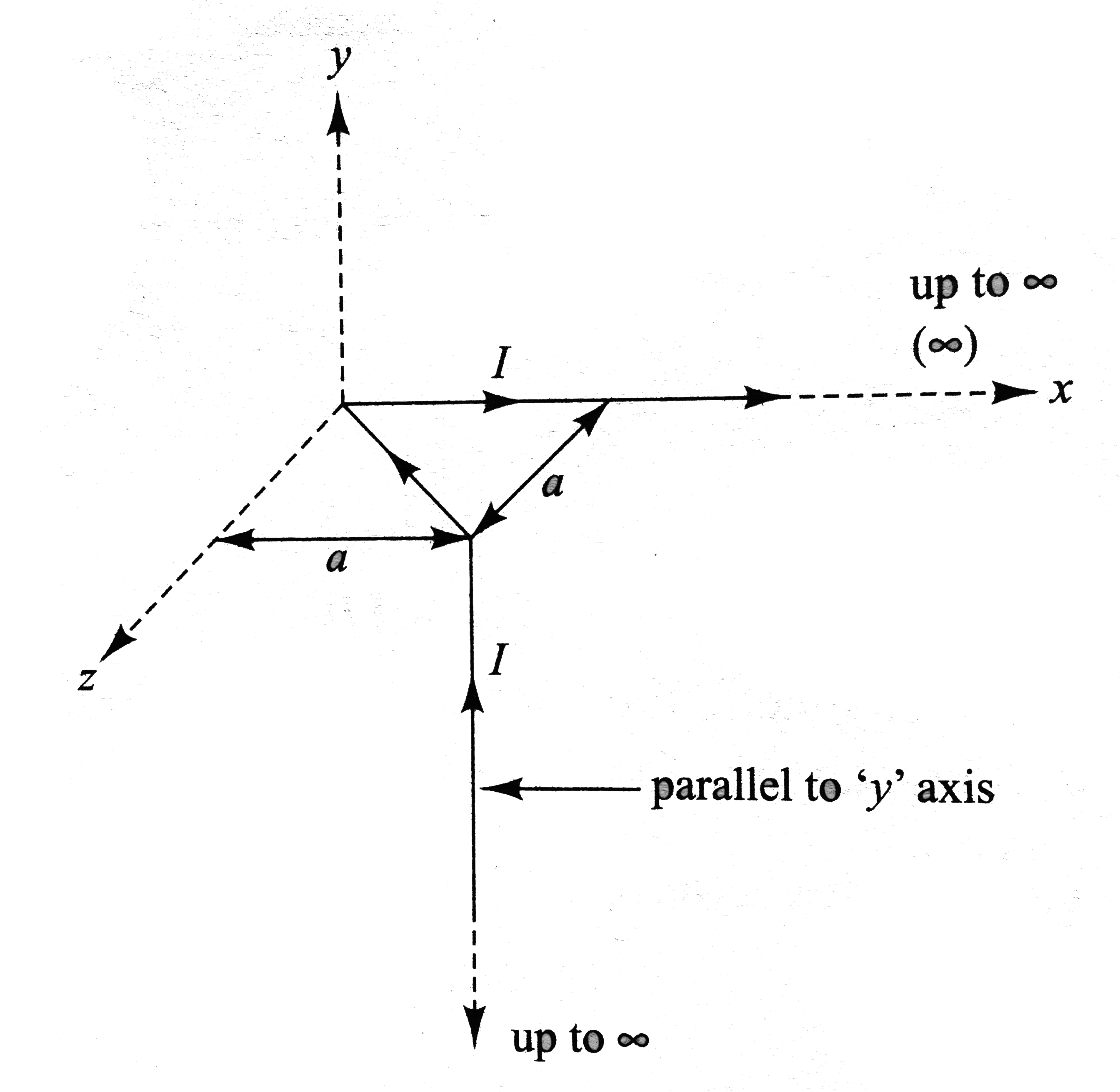
View SolutionIf a charged particle kept at rest experiences an electromagnetic force,
View SolutionTwo infinitely long straight wires lie in the xy-plane along the lines `x =pm R`. The wire located at `x =+R` carries a constant current `I_(1)` and the wire located at ` x = -R` carries a constant current `I_(2)`. A circular loop of radius R is suspended with its centre at `(0,0, sqrt(3)R)` and in a plane parallel to the xy-plane. This loop carries a constant current ? in the clockwise direction as seen from above the loop. The current in the wire is taken to be positive if it is in the `+hat J` direction. Which of the following statements regarding the magnetic field ` vec B` is (are) true?
View Solutionif a charged particle projected in a gravity free room deflects,
View SolutionAn electron and a proton are moving on straight parallel paths with same velocity. They enter a semi infinite region of uniform magnetic field perpendicular to the velocity.
Which of the following statement(s) is /are true?
View SolutionA particle with charge g and mass m is moving with velocity V ,normal to the boundary of the thin region of uniform magnetic field, applied perpendicular to the velocity as shown in the figure. Width of the region is d.

View SolutionTwo long conducting wires are placed parallel to each other at a distance d. Current carried by the wires is `i_(1)" and " i_(2)`. If F is the force acting between them, per unit of length, then which of the following statments is true?
View SolutionAn electron is rotating in a circular orbit with angular speed co. Radius of the circle is R.
View SolutionCurrent `I_(1)` is flowing out from the plane of paper. A steady state current `I_(2)` is flowing in the loop ABCD :

View SolutionFor a positively charged particle moving in a `x-y` plane initially along the `x-axis` , there is a sudden change in its path due to the presence of electric and//or magnetic fields beyond `p` . The curved path is shown in the ` x- y `plane and is found to be non - circular. Which one of the following combinations is possible ?
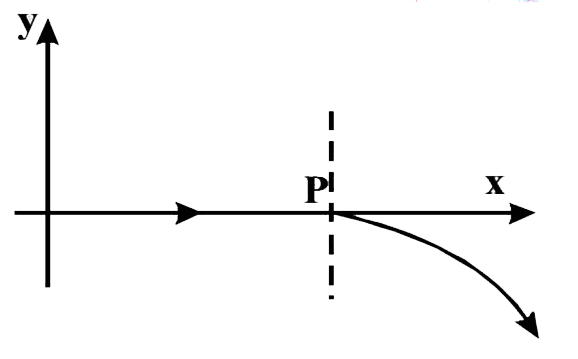
View SolutionA particle of mass `m`and charge `q`, moving with velocity `v` enters Region `II` normal to the boundary as shown in the figure. Region `II` has a uniform magnetic field `B` perpendicular to the plane of the paper . The length of the region `II` is `l`. Choose the correct choice(s).
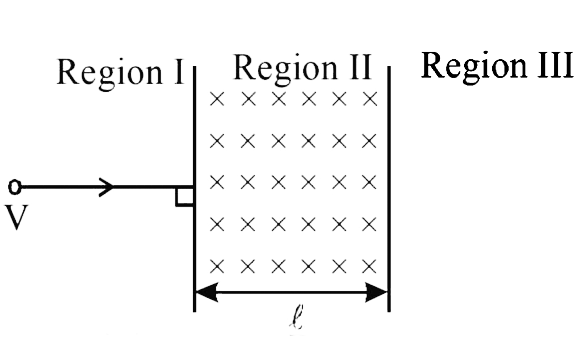
View SolutionA conductor (shown in the figure) carrying constant current `I` is kept in the `x-y` plane in a uniform magnetic field ` vec(B)`. If ` vec(F)` is the magnitude of the total magnetic force acting on the conductor, then the correct statement(s) is (are)
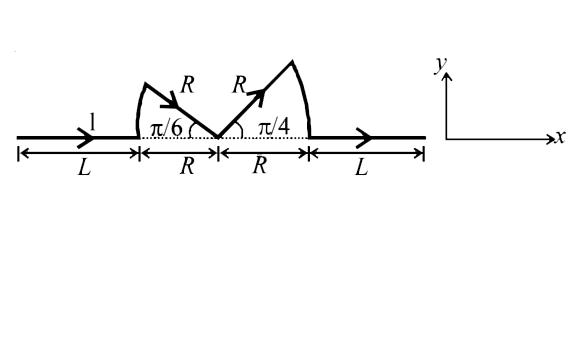
View SolutionAn electron and a proton are moving on straight parallel paths with same velocity. They enter a semi infinite region of uniform magnetic field perpendicular to the velocity.
Which of the following statement(s) is /are true?
View SolutionA rigid wire loop of square shape having side of length L and resistance R is moving along the x-axis with a constant velocity `v_(0)` in the plane of the paper. At `t =0`, the right edge of the loop enters a region of length 3L where there is a uniform magnetic field `B_(0)` into the plane of the paper, as shown in the figure. For sufficiently large `v_(0)` the loop eventually crosses the region. Let x be the location of the right edge of the loop. Let v(x), I(x) and F(x) represent the velocity of the loop, current in the loop, and force on the loop, respectively, as a function of x. Counter-clockwise current is taken as positive.
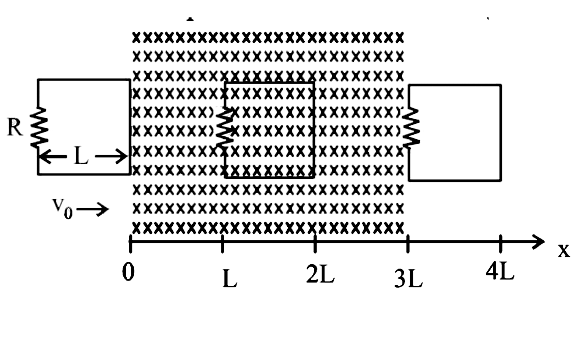 . Which of the following schematic plot(s) is (are) correct? (Ignore gravity)
. Which of the following schematic plot(s) is (are) correct? (Ignore gravity)
View SolutionA particle of mass`M` and positive charge `Q`, moving with a constant velocity ` vec(u_(1)) = 4 hat(i) ms^(-1)`, enters a region of uniform static magnetic field , normal to the ` x-y ` plane. The region of the magnetic field extends from ` x= 0` to ` x = L` for all values of `y`. After passing through this region, the particle emerges on the other side after `10 milliseconds` with a velocity `vec(u_(2)) = 2 (sqrt(3 hat(i) + hat(j))) ms^(-1)` . The correct statement(s) is (are)
View SolutionA steady current `I` flows along an infinitely long hollow cylindrical conductor of radius `R`. This cylinder is placed coaxially inside an infinite solenoid of radius `2 R`. The solenoid has a `n` turns per unit length and carries a steady current `I`. Consider a point `p` at a distance `r` from the common axis . The correct statement(s) is (are)
View Solution
COMPETITION FILE (C. MULTIPLE CHOICE QUESTIONS) questions and complete solutions for chapter MOVING CHARGES AND MAGNETISM of MODERN PUBLISHERS PHYSICS (HINGLISH) of Class 12
All Exercises from MODERN PUBLICATION Class 12 PHYSICS MOVING CHARGES AND MAGNETISM
- CHAPTER PRACTICE TEST
- COMPETITION FILE (A. MULTIPLE CHOICE QUESTIONS)
- COMPETITION FILE (ASSERTION TYPE QUESTIONS)
- COMPETITION FILE (B. MULTIPLE CHOICE QUESTIONS)
- COMPETITION FILE (C. MULTIPLE CHOICE QUESTIONS)
- COMPETITION FILE (D. MULTIPLE CHOICE QUESTIONS)
- COMPETITION FILE (INTEGER TYPE QUESTIONS)
- COMPETITION FILE (MATRIX MATCH TYPE QUESTIONS)
- Conceptual Questions
- Higher Order Thinking Skills & Advanced Level
- NCERT (Exemplar Problems ) (Short Answer Type Questions )
- NCERT (Exemplar Problems ) (Very Short Answer Type Questions )
- NCERT (Exemplar Problems ) Objective Questions (MCQ Type - I)
- NCERT (Exemplar Problems ) Objective Questions (MCQ Type - II)
- NCERT FILE (NCERT Additional Exercises)
- NCERT FILE (NCERT Textbook Exercises)
- PRACTICE PROBLEMS
- Revision Exercises (Additional Questions )
- Revision Exercises (Fill in the Blanks )
- Revision Exercises (Long Answer Questions )
- Revision Exercises (Numerical Problems )
- Revision Exercises (Short Answer Questions )
- Revision Exercises (Very Short Answer Questions )
- SOLVED EXAMPLES
- Tough & Tricky (PROBLEMS )